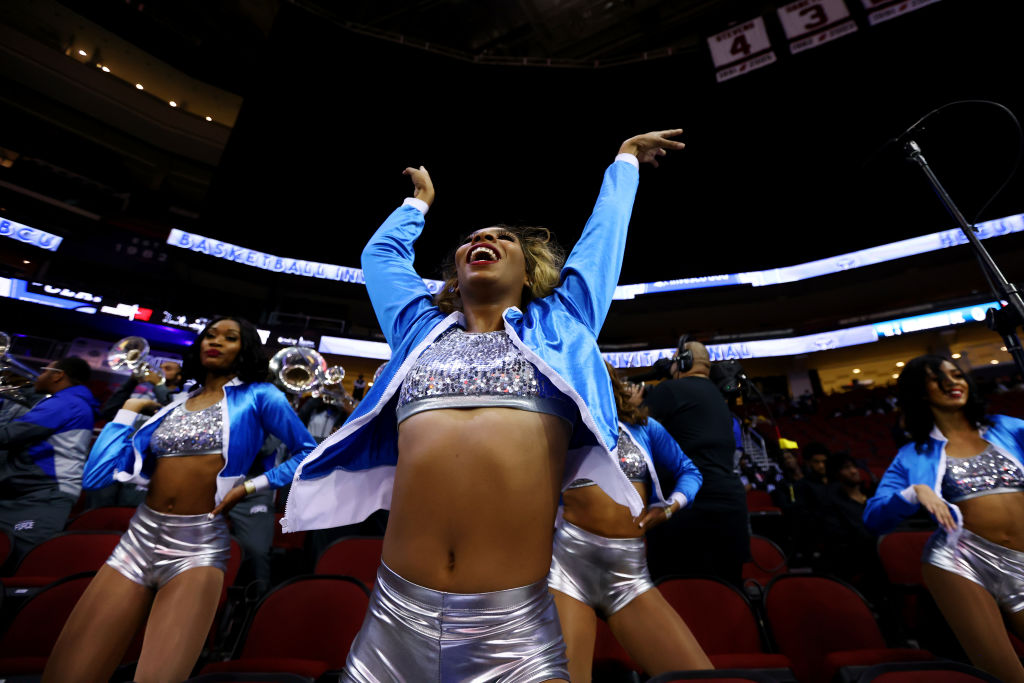PWIs: USC Majorette Team Video Sparks HBCU Debate
Viral Video Of USC ‘Majorette Team’ Renews Debate About HBCU Culture At PWIs

Hampton University dance team members perform before a game in the Legacy Classic HBCU Basketball Invitational at Prudential Center on December 18, 2021, in Newark, New Jersey. | Source: Rich Schultz / Getty
A video showing a dance team at the University of Southern California during its inaugural performance this past weekend has gone viral, but not necessarily for the right reasons depending on who you ask.
The video was posted to social media from an account that is credited to a “singer-actress-dancer” identified as “Princess” who boasted of the new dance troupe’s accomplishment of what amounted to its first gig.
The 8-second clip showed a group of smiling young Black women dancing in sync with each other as a crowd of white fans cheer in the background at the predominately white institution (PWI).
“oh nothing… i created a majorette team at a PWI and performed at our first game,” the tweet said. “truly though i’m so blessed and can’t thank God enough. Thank you to my parents and to everyone who supported me along this LONG journey. and my girls FYE The Cardinal Divas of SC are UP NEXT.”
But what seemed to be a moment of pride for Princess quickly devolved into the ongoing debate about Black culture at white colleges. Specifically, the culture associated with historically Black colleges and universities (HBCUs) on PWI campuses.
Namely, critics on Twitter responded to the video by suggesting that Princess should have just gone to an HBCU if she wanted a Black college experience of dancing in such a group.
“This is great and all but why not just go to an HBCU…,” asked one Twitter user.
A contrarian later argued on Twitter that since white people attend HBCUs and even join historically Black fraternities and sororities, having Black students establish decidedly Black traditions on predominately white college campuses should be a non-starter.
Another Twitter user took the opportunity to provide a history lesson and cautioned Princess about referring to her group as a “majorette team” instead of what the tweet claimed was the more accurate term of “J-Setting/Drill Teams”. The Twitter user said that style of dance was originated at an HBCU.
“While individuals are using the terminology ‘Majorettes’ to describe this dance-style, that is actually incorrect; the proper connotative word is ‘J-Setting or ‘J-Settes’ or ‘Drill Teams’, which is a derivative of the Jackson State University ‘J-Settes’ from whence its named,” the tweet said.
This is far from the first time the HBCU vs PWI debate erupted on social media.
This current situation is reminiscent of the time in 2018 when a Twitter account belonging to Alpha Phi Alpha‘s Zeta Alpha Chapter at the University of Missouri (Mizzou) tweeted a video of a large group of Black students having a good time at an apparent party. The tweet was accompanied by a brief message of encouragement.
“‘MAKE MIZZOU GREAT AGAIN,’” the tweet said with an emoji of someone yelling. “Keep this same energy, see y’all next time.”
But it was a subsequent, since-deleted tweet that poured gasoline on the cultural fire.
“i love my HBCU,” the Twitter response said, seemingly implying that all it takes is a concentrated group of college students who are Black to transform any campus into a Black college.
Of course, historical designations matter.
The Thurgood Marshall College Fund reminds us that HBCUs were founded in the 19th century in part because “Black students were unwelcome at existing public and private institutions of higher education,” also known as PWIs.
HBCU students created a culture that inspires imitation on many levels, as evidenced by the USC dance team video. However, as the saying goes, flattery is the most sincere form of imitation, suggesting that HBCU culture can still thrive on PWI campuses without being offensive to traditions established at historically Black colleges.
SEE ALSO:
White HBCU Student Says He Thought ‘There Would Be More Black People’
White People Are Becoming The Majority Of HBCU Students, Report Finds
















